WTDC-14 Opens with Call for Universal Broadband Connectivity
Record participation in Dubai to chart the way forward
More than 1,600 government policy-makers and industry leaders from 145 countries have gathered in Dubai in the United Arab Emirates to chart the future development of Telecommunications and Information and Communications Technology (ICT) as a catalyst for sustainable, socio-economic development powered by universal broadband connectivity.
Speaking at the opening session of ITU's sixth quadrennial World Telecommunications Development Conference, the theme of which is 'Broadband for Sustainable Development,' ITU Secretary-General, Dr Hamadoun I. Touré called on participants to work together with ITU to ensure universal broadband connectivity, stressing the importance of public-private partnerships towards achieving this goal.
"What we decide and define here over the next two weeks will shape not just the future of ICT development over the next four years, but the future shape of the very world we live in," Dr. Touré stated.
"ICTs – and in particular broadband networks – offer perhaps the greatest opportunity we have ever had to make rapid and profound advances in global social and economic development.
This is of tremendous and timely importance, as we approach the cusp between the MDGs next year, and the beginning of the post-2015 development process."
The conference opened with a welcoming statement by the Chairman of the United Arab Emirates Telecommunication Regulatory Authority, Mr Mohamed AL Qamzy, who recalled several ITU conferences held in Dubai in recent years and thanked the organization for entrusting the UAE to host such important events.
Following the observance of a minute of silence for delegates and ITU colleagues who had passed away since WTDC-10 in Hyderabad, India,
a short documentary was shown to conference participants giving concrete examples of how ITU is helping countries around the world to ensure that all segments of their respective societies have access to the benefits of ICTs.
Filmed in Bulgaria, Costa Rica, Japan, Jordan, Moldova and Tanzania, the documentary focuses on the role of ICT in saving lives particularly in the immediate aftermath of disasters. It also illustrates for example how ITU assistance is helping remote schools and communities in developing countries to access the Internet, to bridge the gender connectivity gap by enabling increasing numbers of girls and women to acquire ICT skills, and to enable persons with disabilities to better integrate society. In another example, a man in Costa Rica explained how he was able to quit smoking through access to an ITU-WHO joint m-health initiative known as m-cessation. The sequence in Japan focused on ITU assistance in providing mobile satellite communication equipment to help authorities coordinate the relief operation in the wake of the earthquake and tsunami which struck the country in 2011.
The conference heard from Dr.Touré how the ICT landscape had evolved in "extraordinary and unexpected ways" since WTDC-10. He noted, for example, how the fall in the number of fixed-line subscriptions had contrasted with the exponential growth of mobile cellular subscriptions which had increased by almost 2.2 billion over the same period.
"And the great news for this conference" Dr. Touré added, "is that almost all of this growth has been in the developing world, which accounted for 90% of the net additions."
He noted that the same pattern had occurred with the Internet, with 817 million of the one billion new internet users over the past four years coming from the developing world.
The ITU Secretary-General stated however that much remained to be done to reduce the digital divide. He recalled, for example, that more than two thirds of people in the developed world have access to the Internet compared to less than one third of the populations in less developed countries. He also noted that fixed and mobile broadband penetration rates at the beginning of 2014 stood at 27.2% and 74.8% respectively in developed countries compared to 6.1% and 19.8% in developing countries.
"And this is why 'Broadband for Sustainable Development' has been chosen as the theme for the WTDC this year. Like you, I am convinced that by extending access to broadband, countries will quickly accelerate sustainable social and economic progress.
By delivering efficiencies across so many areas – from education and healthcare to transportation, water and energy – broadband networks can quickly pay for themselves, creating a virtuous circle of investment, productivity and human development," he added.
To achieve these goals Dr. Touré said he is confident that the public and private sectors will work together to invest in and roll out the necessary infrastructure. "They did this so well in the creation of mobile cellular networks in the developing world, and I expect to see the pattern continued for broadband. I am also convinced that in partnership, they will also help create the necessary services that people need, and that we will quickly see enriched content developed and created that will start off a virtuous circle in stimulating demand. As this happens, we will rapidly see broadband reach the remotest corners of our planet," he said.
In his closing remarks the ITU Secretary-General called on the conference participants to "dream big. Let's be bold. Let's work together to develop the programmes and projects that will ensure ICTs really do deliver a better quality of life – for all the world's people."
ITU Telecommunication Development Bureau Director Brahima Sanou also noted the rapid growth of ICTS over the past four and recalled that he would be giving a 'Hyderabad to Dubai' progress report at a later stage of the conference that would provide a solid foundation for the Dubai Plan of Action that will cover the next four-year cycle.
Among ITU's achievements over the past four years Mr. Sanou stated that ITU had:
- Continued to convene the world's largest gathering of regulators and to track and influence the ICT regulatory environment
- Continued to provide assistance in disaster risk reduction, preparedness and response through the design of national emergency telecommunications plan, the setting up of emergency early warning systems and the development of emergency telecommunications equipment
- Trained over one million women in the use of ICTs under a women's digital literacy campaign launched in partnership with the Telecentre.org Foundation
- Quantified for the first time the size of the digital gender gap
- Assisted 25 countries in transitioning from analogue to digital broadcasting and 43 countries on spectrum management and monitoring
The ITU-D Director made special mention of three initiatives he has launched which have met with considerable success, namely the m-Powering Development Initiative to extend the benefits of mobile technology to all segments of society; the Smart Sustainable Development Model to establish a link between rural telecommunications and ICT development and disaster risk reduction and management; and the ITU Academy which integrates all ITU training activities under one umbrella.
Mr. Sanou recalled however that there are people who had "never seen a phone, people who do not know what the Internet is; and people who do not know that ICTs can change their lives" and that 92 per cent of those not online were in in developing countries. "And that is the reason why we are here. Our mission is far from over."
"Building confidence and security in the use of ICTs is also at the top of our agenda," he said. "We must continue to work together towards creating enabling environments that foster a transparent legal and regulatory framework to stimulate investment and promote universal, ubiquitous and affordable access to ICTs," he concluded.
Following these opening addresses the floor was opened to high-level policy statements which were presented by delegates of a number the 145 countries present and will be summarized in a future edition of WTCD Highlights.
|
 Newsroom Newsroom
Website
Photos
Videos
Social Media Round-up
Photos and videos
Opening Speech
Dr Hamadoun I. Touré, ITU Secretary-General
Opening Speech
Brahima Sanou, Director of the ITU Telecommunication Development Bureau
Opening Speech
H.E. Mohamed Al Qamzy, Chairman, TRA, UAE
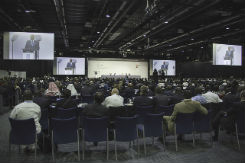
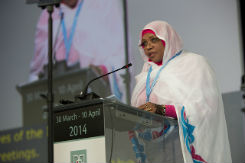
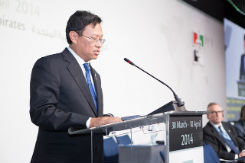
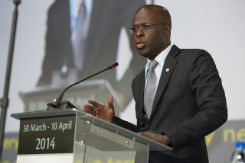
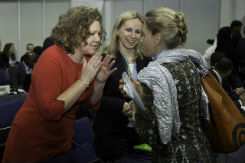
|
